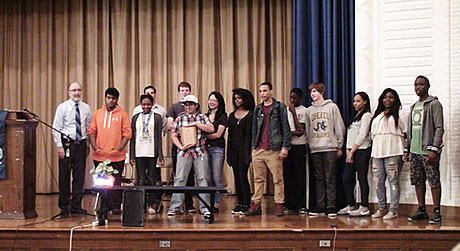
SLA Beeber students accept the Schuylkill Scholastic Drinking Water Award on May 4. Credit: Melissa Bittner, Partnership for the Delaware Estuary.
For most people, watering the garden is an inexact science at best. At worst, unnecessary watering is a double whammy of waste: throwing away good, clean water while increasing the risk of plant problems like mildew and root rot.
But what if you could pop onto your computer or phone and tap into a system that tells you just how much moisture is in your soil, how much sun and heat your plants are getting, and when watering is needed?
That’s exactly what the students at the Science Leadership Academy at Beeber (SLA Beeber) in the city’s Overbrook neighborhood can do when they want to know whether it’s time to turn on the hose at the campus rain garden, and it’s all thanks to a Philadelphia Water partnership called the greenSTEM (that’s short for Science, Technology, Engineering & Mathematics) Network.
From the greenSTEM website:
The greenSTEM Network connects students to real-time information about their school gardens. Through a collaboration between developers, scientists, designers, and educators, we provide public access to information collected by a network of low-cost, DIY sensor kits spread throughout the city for educational purposes. Our mission is to promote Philadelphia’s Green City, Clean Waters program through STEM education and support the development of the Fairmount Water Works Understanding the Urban Watershed curriculum.
The greenSTEM program’s high-tech network of garden sensors is getting attention during National Drinking Water Week (May 3-9) after the Schuylkill Action Network (SAN) honored SLA Beeber’s students with their annual Schuylkill Scholastic Drinking Water Award during a May 4 presentation. SLA Beeber was one of three award winners in 2015. SAN also honored Reading Area Community College in Berks County and Blue Mountain Middle School in Schuylkill County for projects they completed on their campuses.
SLA Beeber students worked with Philadelphia Water to build and install the environmental sensors, called “root kits,” in the rain garden and can now monitor soil moisture and temperature through a webpage that features an interactive tree where the colors of leaves indicate whether a garden needs watering. Individual branches on the tree represent garden sensors at SLA Beeber, Greenfield Elementary in Center City, George W. Nebinger School in Queen Village and Cook-Wissahickon Elementary in Roxborough.
“Projects like this one are very important for keeping the Schuylkill Watershed clean,” Tom Davidock, senior coordinator of the SAN at the Partnership for the Delaware Estuary, wrote on the group’s website. “Schools provide that direct link to communities and can teach all of us simple things we can all do to keep our rivers and streams healthy. The students at the Science Leadership Academy at Beeber are involved in a small project that can have a big impact on the watershed.”
Congratulations to the students at SLA Beeber and all the people at Philadelphia Water who make the greenSTEM Network the incredible program that it is!
More About greenSTEM:
The greenSTEM Network started as a collaboration between the Philadelphia Water and members of Code For Philly at the TechCamp hackathon in February 2013. This unique partnership between a city agency and civic hackers furthers the relationships between technology, education, and environmental stewardship. Grant funding for the greenSTEM Network is provided by NOAA’s Coastal Nonpoint Pollution Control Program and administered by the Pennsylvania Department of Environmental Protection. They have also received Seed Project funding from Drexel University’s ExCITe Center.